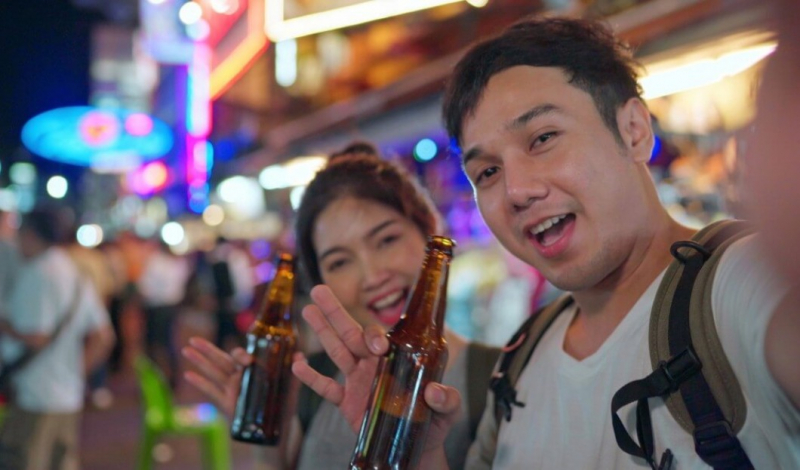Imagine yourself relaxing on a sun-kissed Phuket beach, where the gentle turquoise waves meet the shore, and you reach for an ice-cold Singha beer to salute the setting sun. But, a quick look at your watch—it’s 3 p.m.—and suddenly, that seemingly harmless drink could set you back 10,000 baht (approximately 250 euros). Welcome to Thailand’s updated reality, where the land of smiles is strengthening its resolve when it comes to golden hour enjoyment.
A mere four days after implementation, the “Alcoholic Beverage Control Act (No. 2) B.E. 2568 (2025)” has transformed casual drinking into a timed affair. Officially announced in the Royal Gazette on September 9 and already in force since November 8, the new alcohol law restricts alcohol consumption across the country to specific periods: 11 a.m. to 2 p.m. and 5 p.m. to midnight. Outside these windows—be it enjoying a cocktail on the beach, along Bangkok’s vibrant Khao San Road, or in a peaceful park—and you’re risking fines significant enough to cover a week of pad thai. Public transport allows for no exceptions: Stations and trains are completely off-limits for alcohol; no discussion.
Carving Out Safe Havens Amid the Alcohol Ban
However, not all hope is lost for tourists who prefer late nights or early mornings. The regulations wisely make exceptions for Thailand’s major hospitality players. Hotels, international airport departure areas, and officially licensed bars and clubs can serve alcohol freely at any time, shielding the all-inclusive tourists and seasoned party-goers from the regulations. “These exceptions are intended to maintain a positive atmosphere where it counts,” a Tourism Authority of Thailand (TAT) spokesperson stated, stressing that these changes won’t “unduly hinder” the arrival of 40 million tourists each year.
However, the problem lies in the details—specifically the advertising. The new alcohol law not only governs your drink but also imposes a strict ban on promotion. A casual Instagram post showcasing a beer bottle? That might be considered illegal advertising, potentially costing offenders—like restaurants or brands—fines of up to 500,000 baht (about 12,500 euros), plus an additional 50,000 baht daily until they comply. It’s a wide-reaching measure, intended to reduce the appeal of excess, but some critics worry it will diminish the marketing appeal that draws people to beach bars.
Public Safety vs. Tourism Impact?
The government’s reasoning is clear: fewer drunk drivers on Bangkok’s roads, healthier citizens, and a curb on disruptive public celebrations. Referred to as “contemporary sanctions,” these actions mirror previous sales restrictions (such as the 2-5 p.m. retail ban in place since 1972) but now focus on the consumers themselves. Public health officials view it as a step forward, with a one-year period before full penalties are applied in some instances.
Click here to preview your posts with PRO themes ››
Nevertheless, the hospitality sector is showing considerable concern. “This will be detrimental to tourism and restaurants,” warned Sorathep Rojpotjanaruch, chairman of the Thai Restaurant Business Association, highlighting a “significant impact” on an industry already struggling to recover from the pandemic. Prapawee Hemathas from the Craft Beer Trade Association echoed the concerns: “Small businesses in popular tourist locations will struggle.” A survey from a restaurant association suggests a difficult outlook—with more than 70% expecting reduced nighttime revenue, particularly in areas like Pattaya and Chiang Mai.

International Concern and Local Response
The repercussions are being felt internationally. Foreign ministries in countries like the UK, Australia, and Canada have issued warnings to their citizens: Break the rules, and you will face legal consequences—no special treatment for a little rosé. “A quick beer on your way to a temple? Reconsider,” one advisory notes, pointing out how even innocent sips in public could now result in fines.
On the ground, enforcement is intensifying rapidly. Local police in tourist hotspots like Bangkok, Phuket, Chiang Mai, and Pattaya are authorized to issue immediate warnings or fines. Repeat offenders should expect potential imprisonment. “Controls will become much stricter,” authorities noted. The Tourism Authority of Thailand (TAT) hopes to calm rising anxieties, stressing that exceptions for hotels and entertainment districts will lessen any negative effects. A TAT representative firmly stated, “Tourism is incredibly important to our country,” and emphasized that loopholes were intentionally created to maintain the attractive nightlife that draws both budget and high-end tourists. However, as the peak season draws nearer, there are ongoing discussions about potential revisions, with the Bangkok Post reporting that the government is considering adjusting the “strict penalties” in response to growing opposition.
As bars in Thailand lower their lights during the day, the nation is trying to find a balance between public health and the economic advantages of convenient getaways. Could this change cause tourists to opt for places like Bali, or will it just be a passing phase? For now, tourists should keep an eye on the time, and perhaps bring a non-alcoholic option, as their enjoyment of the beach may depend on it. The government has made promises, but it’s still early, so the approach may involve a mix of education and stricter measures.


